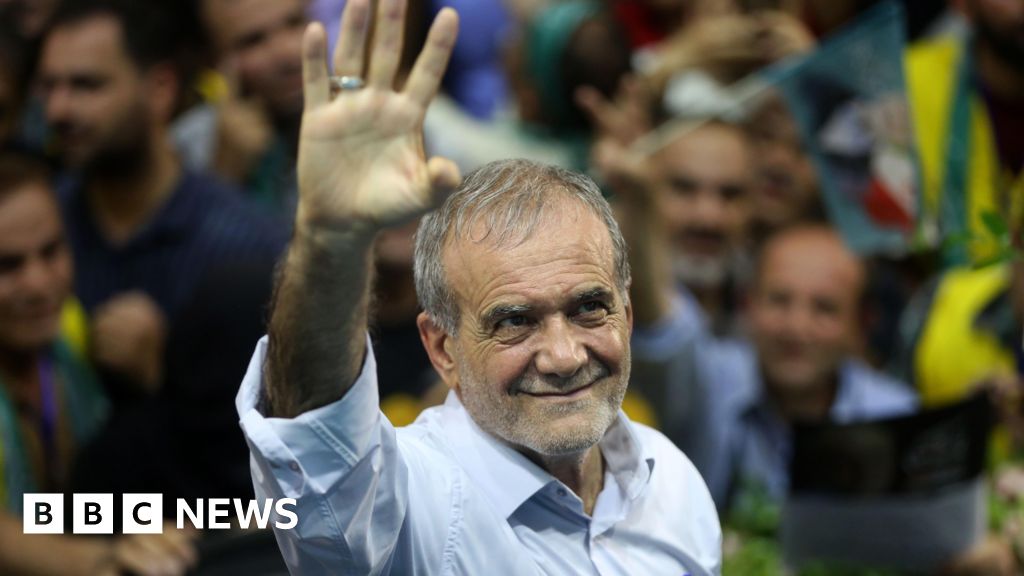World
Iran election: As young lose hope, a reformist runs for president – BBC News

Image source, REX/Shutterstock
- Author, Caroline Hawley
- Role, Diplomatic correspondent
A snap election called after a deadly helicopter crash. A candidate promising a different approach both at home and abroad. And suddenly there’s an element of suspense and unpredictability in Iran, as voters go to the polls to choose a new president.
Elections in the Islamic Republic are tightly-controlled affairs – the candidates are all vetted by an influential committee of clerics before they can stand. And recently voter apathy has been widespread.
But this time there is a wild card: a reformist former heart surgeon and health minister, Massoud Pezeshkian, who has declared “immoral” the actions of Iran’s morality police, who enforce strict dress codes on women.
The rules on wearing the hijab are now being regularly flouted by women and Mr Pezeshkian, 69, has said: “If wearing certain clothes is a sin, the behaviour towards women and girls is 100 times a greater sin. Nowhere in religion is there any permission to confront someone because of their clothing.”
He has also promised to try to improve relations with the West and revive nuclear talks, in the hope of bringing an end to sanctions that have crippled Iran’s economy.
Mr Pezeshkian has been publicly backed by two former reformist presidents, Hassan Rouhani and Mohammad Khatami, and the former foreign minister, Mohammad Javad Zarif.
His campaign rallies attracted growing crowds in the run-up to polling day.
And on Thursday two candidates dropped out of the contest – in an apparent attempt by the clerical establishment to avoid splitting the conservative vote.
Image source, Getty Images
The most recent opinion polls showed Mr Pezeshkian ahead of Mohammad Baqer Qalibaf, a former commander of Iran’s Revolutionary Guards who is currently speaker of parliament, and Saeed Jalili, a hardline former nuclear negotiator.
The conservatives oppose engagement with the West and argue that Iran can succeed despite sanctions.
Turnout figures are seen as a key test of the legitimacy of the Islamic Republic.
They hit record lows in parliamentary elections in March and the last presidential election in 2021.
Supreme leader Ayatollah Ali Khamenei – who is the ultimate authority in Iran – has called for “maximum” turnout. And a solid core of regime supporters are sure to vote.
But many young and middle-class Iranians are deeply disillusioned and distrustful of any political process organised by the Islamic Republic, and now want an end to 45 years of clerical rule.
“There are lots of billboards in the streets asking people to ‘vote for a better tomorrow’, but we just don’t buy it any more,” a 20-year-old student in Tehran told me via text message. “Nobody wants to vote any more.”
Since the death of a young woman, Mahsa Amini, in morality police custody in 2022 – and the nationwide uprising it sparked – the gulf between Iran’s leaders and its people has widened dramatically.
A brutal crackdown on protesters hardened hatred of the regime, particularly among Generation Z.
Hopes pinned on reformists in the past have repeatedly been dashed. And, over the past few years, those wanting reform of the system have been increasingly marginalised.
Former president Hassan Rouhani wasn’t even allowed to stand in recent elections for an influential body, the Assembly of Experts, whose job it is to appoint the Supreme Leader.
Many Iranians have lost hope of any meaningful change being delivered through the ballot box.
“I won’t vote this year,” a 70-year old woman in Tehran, who has previously voted for reformist candidates, told the BBC. “I know nothing will change. The economy is in such a dire state and a generation of young people now just want to leave Iran.”
Azad (not her real name), a women’s rights activist jailed during the protests, described it as an “electoral circus”.
“When the puppeteer is a single person named Khamenei, it makes no difference what name comes out of the ballot box,” she told me over a social media app. “At the peak of the unrest, people repeatedly chanted this slogan in the streets: ‘Reformist, conservative, the game is over’.”
Some believe that the clerical establishment only allowed Mr Pezeshkian to stand as part of an effort to boost turnout.
Azad described it as a “game” being played by the regime. “We don’t trust them and we don’t want to be manipulated again.”
Several people in Tehran I have spoken to over the past few days have echoed that view.
“It’s a duty to vote but I won’t,” a law student told the BBC. “Because all previous elections showed none of the elected presidents made anything better for people.”
But others may be enticed to the polling station by the small glimmer of hope for change that Mr Pezeshkian represents for liberal-minded Iranians.
“I’ll be voting for Pezeshkian,” Maryam, 54, from Tehran says. “I believe that change can only come from inside Iran – through reform.”
She likes the fact that his background is not in the security forces and that he’s “clean”, with no allegations of corruption against him.
She also hopes he can improve Iran’s relations with the outside world, and believes he will win.
If he does, there is a huge question mark over what room for manoeuvre he will have.
“Pezeshkian is a reformist in name only,” says Sanam Vakil of think-tank Chatham House.
“He supports the Islamic Republic and is deeply loyal to the supreme leader. His participation could potentially boost public turnout and increase enthusiasm, but one should not expect much more than a difference in tone should he be elected.”







:max_bytes(150000):strip_icc()/roundup-writereditor-loved-deals-tout-f5de51f85de145b2b1eb99cdb7b6cb84.jpg)


